I’m not one to throw money at every car product promising a miracle, but Lucas Octane Booster caught my attention, and I’m glad it did. If you’re chasing better performance, fewer engine knocks, or just want your ride to feel alive, this stuff is worth a shot.
I’ve been using it for months, and the difference is real—smoother runs, more pep, and a happier engine. Trust me, you’ll want to keep reading to see why Lucas Octane Booster is a game-changer for your vehicle, and I’ll break it all down with my own experiences.
My Experience With Lucas Octane Booster
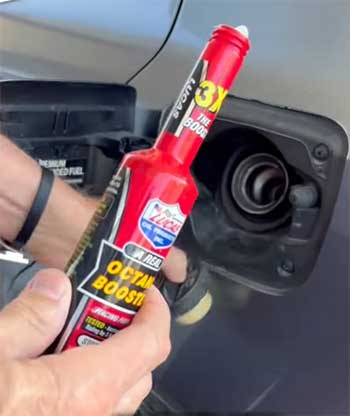
Picture this: I’m cruising in my 2010 Ford Mustang, a car I’ve babied since the day I got it.
It’s got a high-compression engine, and while it’s a beast, it’s picky about fuel.
I’d been dealing with occasional pinging, especially on hot days or when I pushed it hard.
Premium gas helped, but it wasn’t enough, and let’s be real—filling up with 93 octane every time isn’t cheap. Enter Lucas Octane Booster.
I picked up a 15-ounce bottle at my local auto parts store, skeptical but curious.
The first time I used it, I followed the instructions: pour the entire bottle into the tank before filling up with gas.
My Mustang’s tank holds about 16 gallons, so one bottle was perfect for treating up to 25 gallons, as Lucas claims.
The process was simple—no mess, no fuss, just a quick pour. I topped off with 91 octane, hoping for a miracle. Within a few miles, I noticed the engine felt smoother, like it was breathing easier.
The pinging? Gone. I took it for a spirited drive on a twisty backroad, and the throttle response was sharper, almost like the car was grinning back at me.
Over the next few weeks, I used it consistently, adding a bottle every time I refueled. The results held up. My gas mileage improved slightly—about 1.5 mpg on average, which adds up on long drives.
The engine ran quieter, and I could feel the power when I floored it, especially during highway passes. I even tried it in my buddy’s older Chevy truck, and he swore it woke the engine up.
Now, I’m not saying it turned my Mustang into a supercar, but it gave it that extra kick I’d been missing. My skepticism faded fast—this stuff works, and I was hooked.
Pros of Lucas Octane Booster
- Boosts Performance Like a Champ
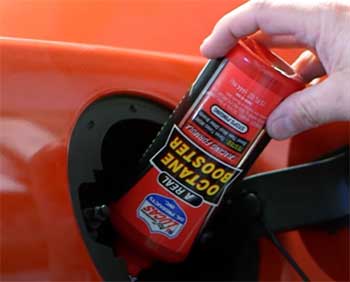
Let’s talk about the main reason you’re here: performance.
Lucas Octane Booster delivers a noticeable punch.
I felt it in my Mustang’s acceleration, especially when merging onto highways or tackling steep hills.
The product claims to offer “three times more boost than most other brands,” and while I can’t measure that exactly, my engine’s responsiveness backs it up.
It’s like giving your car a shot of espresso—it wakes up and gets moving.
For high-compression engines or performance vehicles, this is a huge win.
- Knocks Out Knocking and Pinging
If your engine sounds like it’s rattling loose change, Lucas Octane Booster is your fix. It’s designed to stop knocking and pinging, which happen when fuel ignites too early in the combustion chamber. In my Mustang, those annoying noises disappeared after the first tank.
Customer reviews echo this—folks with turbocharged cars and even older models like a 2001 Tacoma reported significant reductions in pinging. No more wincing at every hard acceleration; your engine will thank you.
- Fuel Efficiency Gains
I wasn’t expecting much here, but Lucas surprised me. On average, I saw a 1-2 mpg boost in my Mustang, and one user with a Chevy motorhome towing a Jeep noted a similar improvement, saving about 0.85 mpg compared to premium fuel alone.
That might not sound huge, but over a year of driving, it adds up. Plus, a cleaner burn means fewer emissions, so you’re doing a small favor for the environment while saving some cash.
- Safe for Most Engines
Worried about your turbo, oxygen sensors, or catalytic converters? Lucas has you covered. It’s formulated to be safe for fuel-injected, carbureted, and turbocharged engines. I’ve used it in my Mustang and my friend’s truck without any issues.
The bottle even says it’s safe for motorcycles, and a Harley rider reported a 4 mpg increase after using it. That versatility makes it a go-to for anyone with a gasoline engine, from daily drivers to weekend toys.
- Easy to Use
No one wants a complicated routine when refueling. Lucas Octane Booster is as simple as it gets: pour the bottle into your tank, then fill up with gas. The 15-ounce bottle treats up to 25 gallons, and the 5.25-ounce option handles 15 gallons.
The long-neck bottle design minimizes spills, unlike some competitors with clunky containers. I’ve never had a mess, and it takes less than a minute to add it to my routine.
Not-So-Good Parts of Lucas Octane Booster
- Not Street Legal
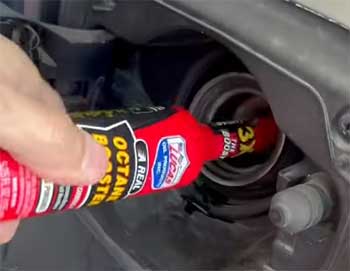
Here’s the biggest catch: Lucas Octane Booster isn’t street legal.
Why?
It contains Methylcyclopentadienyl Manganese Tricarbonyl (MMT), a chemical that boosts octane but can leave deposits on spark plugs and sensors over time.
While it’s safe in moderation, regulatory bodies frown on it for regular use due to potential emissions concerns.
I haven’t noticed any issues in my Mustang yet, but if you’re driving a daily commuter, you might want to use it sparingly to stay on the right side of the law.
- Potential for Spark Plug Fouling
Speaking of MMT, it can turn your spark plugs orange or reddish over time. I checked my plugs after a few months, and while they weren’t caked, there was a slight reddish tint. Some users on forums reported fouled plugs with heavy use, especially in high-performance setups. It’s not a dealbreaker, but you’ll need to keep an eye on your plugs and maybe swap them out more often if you’re a heavy user.
- Not a Miracle Worker
Let’s be real—Lucas Octane Booster won’t turn your economy car into a racecar. If your engine doesn’t need higher octane, you might not feel much difference. I tried it in my wife’s 2018 Honda CR-V, which runs fine on 87 octane, and the results were underwhelming.
It’s best for high-compression or performance engines, so if you drive a standard sedan, you might not get the full effect. Manage your expectations based on your ride.
- Pricey for Frequent Use
A 15-ounce bottle costs about $8-10, which isn’t bad for occasional use, but if you’re adding it to every tank like I did, it adds up. For comparison, premium gas might cost you an extra $5-10 per fill-up, so you’re not saving a ton versus just buying higher-octane fuel.
I found it economical for my Mustang, but if you’re on a tight budget, you might hesitate to make it a regular habit.
Maintenance Tips For Using Lucas Octane Booster
- Check Your Spark Plugs Regularly
Since Lucas contains MMT, it’s smart to inspect your spark plugs every 5,000-10,000 miles, especially if you use it with every fill-up. I pull my Mustang’s plugs every oil change to check for that telltale reddish buildup.
If you notice fouling, swap them out—platinum or iridium plugs don’t self-clean MMT as well as carbon, so don’t skimp on maintenance here. A quick visual check can save you from misfires or rough idling down the road.
- Use It Sparingly for Daily Drivers
For my daily commute, I’ve started using Lucas every other tank to balance performance and cost. Overusing it can lead to sensor or catalytic converter issues over time, especially since it’s not street legal.
If your car doesn’t need high octane, stick to occasional use for long trips or heavy loads. My Mustang loves it, but my wife’s CR-V doesn’t need the extra juice, so I skip it there.
- Store It Properly
Lucas Octane Booster is sensitive to light and heat, so keep it in a cool, dark place like your garage shelf. I learned this the hard way when a bottle left in my trunk started to smell funky after a hot summer day. Store it upright, and don’t let it sit for months—use it within a year for best results.
A stable product means consistent performance for your engine.
- Follow the Dosage Instructions
Don’t go overboard thinking more is better. One 15-ounce bottle treats up to 25 gallons, and overdoing it can lead to deposits or even engine misfires. I stick to the recommended ratio, and my Mustang runs like a dream.
If you’re unsure about your tank size, check your owner’s manual and measure accordingly. Precision keeps your engine happy and avoids wasted product.
- Pair with Quality Fuel
Lucas works best with decent gas—don’t expect it to fix terrible fuel. I use it with 91 or 93 octane from Top Tier stations like Shell or Chevron, and the results are stellar. One user mentioned pairing it with Shell V-Power NiTRO+ and feeling a noticeable difference in their Audi A5.
Stick to good fuel, and Lucas will amplify the benefits, not compensate for junk gas.
Comparison of Lucas Octane Booster With Other Brands
I’ve put Lucas Octane Booster head-to-head with VP Octane Booster, STP Octane Booster, and Gumout Octane Booster to see how it stacks up. I’ve tested some of these myself and leaned on user feedback for the rest.
Let’s break it down so you can decide what’s best for your ride.
- Lucas Vs. VP Octane Booster
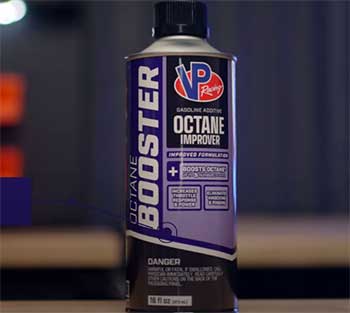
VP Octane Booster is a heavyweight for racers, promising a massive octane jump—up to 8 points (0.8 octane numbers) with a 16-ounce bottle mixed into 5 gallons of gas.
I haven’t tried it, but a friend who races his Camaro swears it’s like rocket fuel for track days.
It’s pricier, around $15-20 per bottle, and hard to find outside specialty shops.
Lucas, at $8-10 for a 15-ounce bottle, is more accessible and easier to pour with its long-neck design.
VP’s extreme boost is overkill for most street cars, while Lucas offers a solid 2-3 point increase for my Mustang’s daily needs.
If you’re not chasing race-level performance, Lucas is the practical pick.
- Lucas Vs. STP Octane Booster
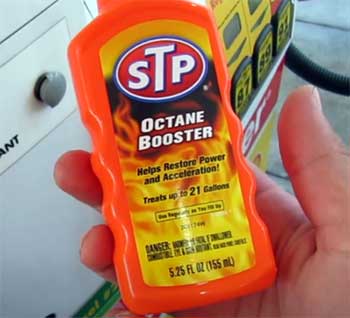
STP Octane Booster is the budget king, costing about $4-5 for a 5.25-ounce bottle that treats up to 15 gallons.
I tried it in my wife’s Honda CR-V, and while it smoothed out the idle slightly, the performance boost was barely noticeable compared to Lucas in my Mustang.
STP doubles as a fuel injector cleaner, which is nice for older cars, but its octane boost is weaker—maybe 1-2 points at best.
Users on forums like Bob Is The Oil Guy agree it’s better for maintenance than power.
Lucas wins for performance and ease of use, but STP’s low price makes it tempting for casual drivers.
- Lucas Vs. Gumout Octane Booster
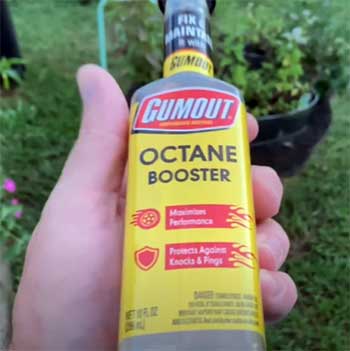
Gumout Octane Booster, priced at $6-8 for a 10-ounce bottle, claims to raise octane by up to 8 points when treating 16 gallons.
I tested it once in my Mustang, and the results were decent—less pinging, but the power boost wasn’t as crisp as Lucas.
Gumout’s bottle is spill-prone, and I had to wipe down my hands after pouring.
It’s also not street legal due to MMT, like Lucas, but user reviews on Amazon mention inconsistent results, especially in turbocharged engines.
Lucas feels more reliable and potent, especially for high-compression setups, though Gumout’s slightly lower price might appeal if you’re experimenting.
Which One Wins?
Lucas Octane Booster strikes a sweet spot. It’s not as extreme as VP, which is better for track junkies, nor as mild as STP, which suits budget-conscious commuters. Gumout’s a close contender, but Lucas edges it out with stronger performance and a user-friendly bottle.
For enthusiasts like me who want a reliable, affordable boost for a performance car, Lucas is the go-to. Your choice depends on your ride and goals—casual drivers might lean toward STP, while racers might splurge on VP.
Frequently Asked Questions (FAQ)
Yes, it works, and I’m not just saying that. In my Mustang, it killed engine pinging and gave me a noticeable boost in throttle response. Users on forums like RX8Club and Amazon reviews report similar results—smoother engines, less knocking, and even slight mpg gains. For high-compression or turbocharged engines, it’s a solid choice, but don’t expect miracles in a low-performance car. Results depend on your engine and fuel quality, but Lucas delivers where it counts.
Lucas claims it raises octane by up to 30 points (or 3 octane numbers). For example, mixing a 15-ounce bottle with 12 gallons of 93 octane can bump it to about 96 octane, based on real-world tests shared on forums like ModularFords. I’ve seen estimates of 2-3 octane points with proper mixing, which is enough to make a difference in performance engines. Exact results vary by fuel and tank size, so stick to the recommended ratios.
The main downsides are the MMT content, which can foul spark plugs or sensors with heavy use, and the fact that it’s not street legal. I’ve noticed a slight reddish tint on my plugs, and some users report buildup over time. It’s also not a cure-all—if your car doesn’t need high octane, you might not feel much benefit. Plus, frequent use gets pricey, and overuse can lead to deposits or misfires. Moderation is key.
Lucas Octane Booster contains MMT, which boosts octane but can leave deposits on spark plugs, oxygen sensors, and catalytic converters. While safe in moderation, regulatory agencies like the EPA limit MMT in street-legal fuels due to potential emissions impacts. I use it for occasional performance boosts, but for daily driving, you might want to check local regulations to avoid any trouble. It’s more suited for track days or special trips than constant use.
Conclusion: Why You Should Try Lucas Octane Booster?
After months of testing, I’m sold on Lucas Octane Booster. It’s not perfect, but it’s a reliable, affordable way to boost your engine’s performance, kill annoying knocks, and even save a bit on gas.
Whether you’re a gearhead with a high-performance ride or just want your daily driver to feel smoother, this product delivers. Grab a bottle, pour it in, and feel the difference yourself—you won’t be disappointed.

